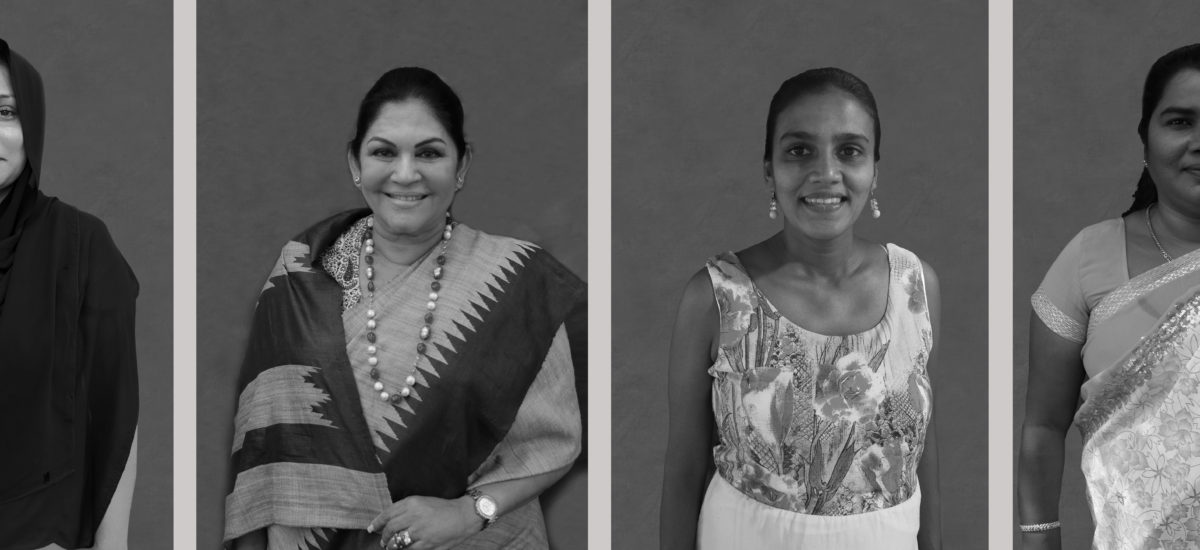Editor’s Note: These are excerpts from a long-form story on online harassment against women politicians – an issue which is not restricted to one particular party. In order to ensure attention to individual stories, we are publishing each individual story separately
‘When you’re having a conversation, your message might reach four or five people. With technology acting as a mouthpiece, you can reach thousands at a time. And when you don’t see the person you’re speaking to in front of you, people feel they can say whatever they want.’
Chilaw UC member and attorney-at-law Jeevanee Kariyawasam notes that the cloak of anonymity often enjoyed by people on the Internet leads to offline threats and harassment as well. Her decision to enter the political fraternity has also led to her family being targeted as well.

‘My mother would get phone calls from people threatening to kill her and warning her not to step out of the house, and further threatening her if she lodged official complaints about them.’ Kariyawasam’s mother is herself a well-known politician and a strong supporter of her daughter, despite the intimidation.
Fiercely independent and outspoken, Kariyawasam didn’t hesitate to use Facebook as a channel for her political opinions, especially in 2009, when the last stages of the war were being fought. While news on the situation at the front was restricted within Sri Lanka, those outside in countries such as the United Kingdom, where she was studying at the time, had freer access to information – and more space to debate and openly criticise.
‘At that time, it was possible to have a discussion with some discipline with the people who left comments on the post’, she said, laughing. There was a certain respect that the commenters had in engaging with each other, even when opinions differed. That respect is not always visible now, she observes.
Kariyawasam used social media in the run up to the 2011 Local Government Elections, at a time when many others questioned its efficacy as a campaign tool.
Yet, social media allowed her to easily reach her friends overseas who helped rally support for her by encouraging their mothers and other relatives still in Sri Lanka to vote. The strategy worked – for a newcomer, Kariyawasam said she fared surprisingly well even against more established candidates. However, with this success came an increase in hate online – much of it personal. Her personal account, she notes, received far more backlash than her official Facebook page.
The posts that drew the strongest backlash were those that criticised the general Secretary of the Bodu Bala Sena, Gnanasara Thero and Ampitiya Sumana Thero from Batticaloa, both of them known for rhetoric encouraging hate and indeed violence against religious minorities, and Muslims in particular.
‘My responses are usually rational, pointing out that what these radical monks preach and champion is far from true Buddhism’ she says, ‘These are statements that people can’t easily retort to.’ It is when those sympathetic to these figures and the rhetoric that they promote don’t have valid points to refute her arguments that they resort to filth and derogatory comments, she points out. In many instances, she said, these attacks came from surprising quarters, she said.
‘These attacks are being carried out against us by people who know us and know things about us. Gnanasara’s goons don’t have time to be sifting through my posts online.’
She notes that filing multiple complaints against those who harass her online will be of no use if no action is taken. For this reason, she is worried about being subjected to physical violence as an extension of, and in addition to, the violence she has seen on social media.
If Kariyawasam travels to the South for work, she usually posts about it online, and tags a location in the general vicinity (she is careful not to specify where, for her own safety). It is now a common occurrence to see comments asking her not to come to the South, and threatening to kill her for criticising Mahinda Rajapakse. Many of them appear to be from the Army or Navy, she adds, with their uniforms visible in some of the photos.
Kariyawasam says she has not been affected by these experiences – she remains defiant and committed to her work. Yet she knows that not all women will be as resilient. ‘There is a lot of talk of bringing more women into politics. However when these women get elected, if they aren’t from political backgrounds and seasoned in dealing with this type of vitriol from people, they will resort to self-censorship.’
‘I’d advise them not to back down, to turn the attack on these commenters instead!” she says when asked how women should respond to harassment online.
While most who receive these comments would either ignore or block them, Kariyawasam’s strategy has marked her out as outspoken. ‘I retaliate – I take an hour off my morning to respond to all the comments people leave. I don’t have time to watch it unfold all day, but I take an hour later at some point to read through everything and respond where necessary.’ She doesn’t block anyone on her pages either; ‘the more people see the post, the more people keep lashing out in the comments, they are ones who help send it viral,” she laughs.
Read the full story here.

